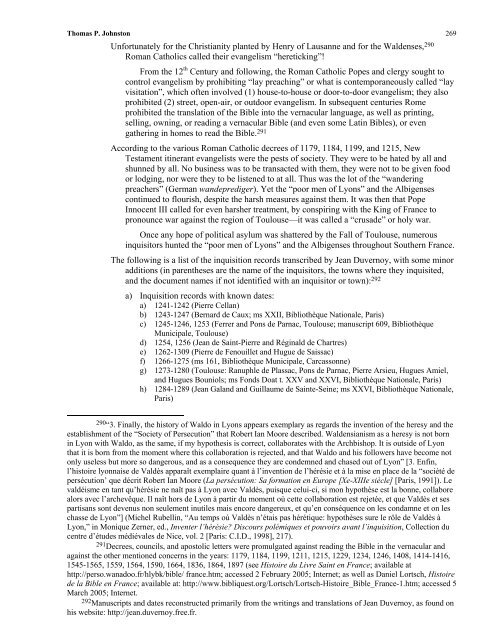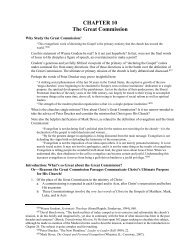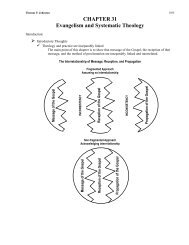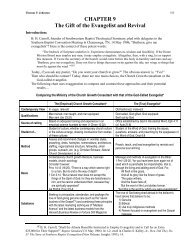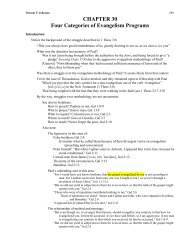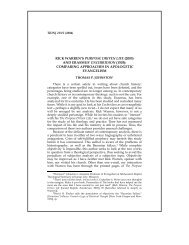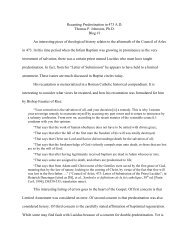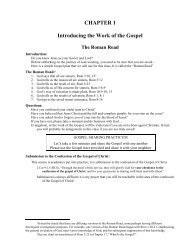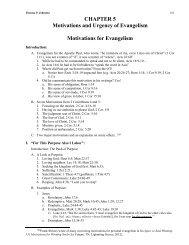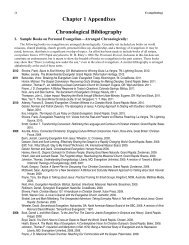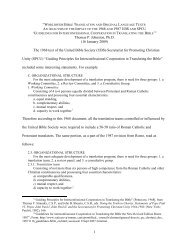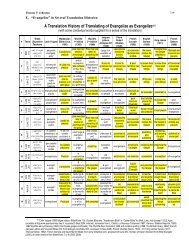CHAPTER 7 Defining Evangelizing - Evangelism Unlimited
CHAPTER 7 Defining Evangelizing - Evangelism Unlimited
CHAPTER 7 Defining Evangelizing - Evangelism Unlimited
You also want an ePaper? Increase the reach of your titles
YUMPU automatically turns print PDFs into web optimized ePapers that Google loves.
Thomas P. Johnston 269<br />
Unfortunately for the Christianity planted by Henry of Lausanne and for the Waldenses, 290<br />
Roman Catholics called their evangelism “hereticking”!<br />
From the 12 th Century and following, the Roman Catholic Popes and clergy sought to<br />
control evangelism by prohibiting “lay preaching” or what is contemporaneously called “lay<br />
visitation”, which often involved (1) house-to-house or door-to-door evangelism; they also<br />
prohibited (2) street, open-air, or outdoor evangelism. In subsequent centuries Rome<br />
prohibited the translation of the Bible into the vernacular language, as well as printing,<br />
selling, owning, or reading a vernacular Bible (and even some Latin Bibles), or even<br />
gathering in homes to read the Bible. 291<br />
According to the various Roman Catholic decrees of 1179, 1184, 1199, and 1215, New<br />
Testament itinerant evangelists were the pests of society. They were to be hated by all and<br />
shunned by all. No business was to be transacted with them, they were not to be given food<br />
or lodging, nor were they to be listened to at all. Thus was the lot of the “wandering<br />
preachers” (German wandeprediger). Yet the “poor men of Lyons” and the Albigenses<br />
continued to flourish, despite the harsh measures against them. It was then that Pope<br />
Innocent III called for even harsher treatment, by conspiring with the King of France to<br />
pronounce war against the region of Toulouse—it was called a “crusade” or holy war.<br />
Once any hope of political asylum was shattered by the Fall of Toulouse, numerous<br />
inquisitors hunted the “poor men of Lyons” and the Albigenses throughout Southern France.<br />
The following is a list of the inquisition records transcribed by Jean Duvernoy, with some minor<br />
additions (in parentheses are the name of the inquisitors, the towns where they inquisited,<br />
and the document names if not identified with an inquisitor or town): 292<br />
a) Inquisition records with known dates:<br />
a) 1241-1242 (Pierre Cellan)<br />
b) 1243-1247 (Bernard de Caux; ms XXII, Bibliothèque Nationale, Paris)<br />
c) 1245-1246, 1253 (Ferrer and Pons de Parnac, Toulouse; manuscript 609, Bibliothèque<br />
Municipale, Toulouse)<br />
d) 1254, 1256 (Jean de Saint-Pierre and Réginald de Chartres)<br />
e) 1262-1309 (Pierre de Fenouillet and Hugue de Saissac)<br />
f) 1266-1275 (ms 161, Bibliothèque Municipale, Carcassonne)<br />
g) 1273-1280 (Toulouse: Ranuphle de Plassac, Pons de Parnac, Pierre Arsieu, Hugues Amiel,<br />
and Hugues Bouniols; ms Fonds Doat t. XXV and XXVI, Bibliothèque Nationale, Paris)<br />
h) 1284-1289 (Jean Galand and Guillaume de Sainte-Seine; ms XXVI, Bibliothèque Nationale,<br />
Paris)<br />
290 “3. Finally, the history of Waldo in Lyons appears exemplary as regards the invention of the heresy and the<br />
establishment of the “Society of Persecution” that Robert Ian Moore described. Waldensianism as a heresy is not born<br />
in Lyon with Waldo, as the same, if my hypothesis is correct, collaborates with the Archbishop. It is outside of Lyon<br />
that it is born from the moment where this collaboration is rejected, and that Waldo and his followers have become not<br />
only useless but more so dangerous, and as a consequence they are condemned and chased out of Lyon” [3. Enfin,<br />
l’histoire lyonnaise de Valdès apparaît exemplaire quant à l’invention de l’hérésie et à la mise en place de la “société de<br />
persécution’ que décrit Robert Ian Moore (La persécution: Sa formation en Europe [Xe-XIIIe siècle] [Paris, 1991]). Le<br />
valdéisme en tant qu’hérésie ne naît pas à Lyon avec Valdès, puisque celui-ci, si mon hypothèse est la bonne, collabore<br />
alors avec l’archevêque. Il naît hors de Lyon à partir du moment où cette collaboration est rejetée, et que Valdès et ses<br />
partisans sont devenus non seulement inutiles mais encore dangereux, et qu’en conséquence on les condamne et on les<br />
chasse de Lyon”] (Michel Rubellin, “Au temps où Valdès n’étais pas hérétique: hypothèses sure le rôle de Valdès à<br />
Lyon,” in Monique Zerner, ed., Inventer l’hérésie? Discours polémiques et pouvoirs avant l’inquisition, Collection du<br />
centre d’études médiévales de Nice, vol. 2 [Paris: C.I.D., 1998], 217).<br />
291 Decrees, councils, and apostolic letters were promulgated against reading the Bible in the vernacular and<br />
against the other mentioned concerns in the years: 1179, 1184, 1199, 1211, 1215, 1229, 1234, 1246, 1408, 1414-1416,<br />
1545-1565, 1559, 1564, 1590, 1664, 1836, 1864, 1897 (see Histoire du Livre Saint en France; available at<br />
http://perso.wanadoo.fr/hlybk/bible/ france.htm; accessed 2 February 2005; Internet; as well as Daniel Lortsch, Histoire<br />
de la Bible en France; available at: http://www.bibliquest.org/Lortsch/Lortsch-Histoire_Bible_France-1.htm; accessed 5<br />
March 2005; Internet.<br />
292 Manuscripts and dates reconstructed primarily from the writings and translations of Jean Duvernoy, as found on<br />
his website: http://jean.duvernoy.free.fr.


